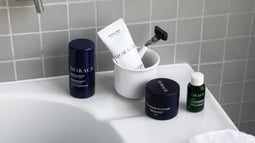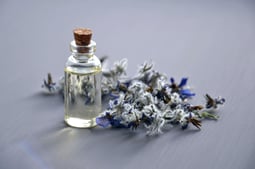

How to calm redness, tightness, and relieve discomfort in your sensitive skin.
Your face doesn’t have a monopoly when it comes to sensitivity. Turns out your body’s skin can also react strongly to climatic changes, unsuitable or aggressive products, or to stress. This manifests into feelings of tightness, tingling, itching, redness, roughness, or even small pimples.
How to Explain the Sensitive Skin of the Body
Sensitive skin is usually caused by multiple factors. Firstly, external such as the weather and unsuitable skincare products. Secondly is internal factors like stress. The back of your hands, the back of your arms and your upper torso are among the areas of your body where the skin is the thinnest and therefore where your skin's sensitivity is most noticed.
Due to frequent hand washing with soap that’s too concentrated in harsh detergents, your skin is prevented from maintaining its naturally acidic pH (around 5) which is essential to its health. Tightness and itching are other symptoms that you might notice. The same thing goes for your body, after taking showers that are too hot and long, taking hot baths, or using aggressive toiletries.
Strong allergies to the sun can also explain the appearance of redness and rashes on the arms and collarbones. It’s likely mild summer lucite, which occurs one to two days after the first sunny days of spring.
The skin of your body can be sensitised because of its dryness. The cold winter weather and/or dehydrating heating can dry it out, weaken it, and leave it feeling vulnerable and more sensitive.
Certain medical treatments like antibiotics can also sensitize the skin by affecting the good bacteria that coat it to defend it.
What to Avoid
To best protect your skin, you should avoid prolonged exposure to the sun, especially without protection. Synthetic clothing can increase perspiration, thus transepidermal water loss, and leave your skin majorly dehydrated.
Keep in mind that some soaps that are too strong in harsh detergents eliminate both dirt and protective lipids from the skin, disrupting your skin’s pH and its ability to defend itself against external aggressions. Other cleansing formulas contain harsh sulfates like sodium lauryl sulfate which could affect the fragile protective barrier function of your skin.
It’s also important to limit sensitising ingredients such as synthetic fragrances present in large quantities, dyes, and drying alcohol, and to favour the most natural formulas possible.
What care should be given to the sensitive skin of the body?
Step one: wash with a mild shower gel
Unlike some stripping soaps and shower gels, a sulfate-free shower gel will best respect the protective hydrolipidic film of the skin. Choosing one with a slightly acidic pH like ours will exempt the sensitive skin from having to rebalance itself after the shower. Some ingredients even serve to soothe it, such as witch hazel floral water which reduces redness. Instead of sulfates, natural and mild surfactants derived from coconut provide gentle cleansing. Instead of a potentially irritating synthetic fragrance, a blend of essential oils helps perfume and preserve the shower gels that are 99% natural and tested to be suitable for all skin types, even the most sensitive.
Step two: pat dry
As rubbing risks increasing the sensitivity of the skin, washcloths and loofahs can be relegated to the shower bench. When it's time to dry off, pat drying against your skin helps you be as gentle as possible.
Step three: hydrate your body with products suitable for sensitive skin
After cleansing, moisturising your body will help your skin regain its ability to act as a barrier against external aggressions and dehydration. Plant-based fats like shea butter and coconut oil will protect your skin and will come in handy when it feels significantly uncomfortable, tight, or itchy.
Your hands deserve special attention since its skin is thin, has very few sebaceous glands, and is highly exposed to external aggressions. Applying a moisturising balm helps preserve it as well as guarantee a good first impression when it’s time to handshake.
Step four: choose a deodorant without aluminum or alcohol
Alcohol-based or aluminum-based deodorants are often the source of irritation for sensitive skin, in addition to leaving embarrassing yellowish stains on your white shirts. Going natural will help you avoid cold sweats.
By turning to products that respect your skin, you’ll quickly rediscover the comfort in your skin.








